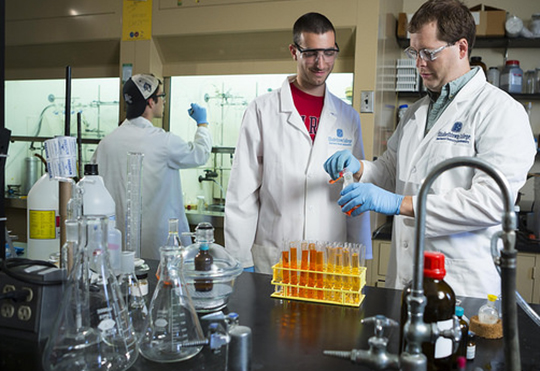Every now and again James MacKay notices students referring to themselves as ‘organic chemists’ or ‘forensic chemists’. They categorize themselves into specific sub-disciplines of their chosen major before they’ve had an opportunity to explore others.
With this in mind, MacKay and fellow chemistry professors created an integrated lab in which chemistry students can break down some of these barriers in the context of a novel research problem.
E-town chemistry students “vary widely in career interests,” said MacKay, associate professor of chemistry. Some plan to go to medical school; others are interested in industry. Still others choose jobs outside of chemistry. What they don’t always grasp, however, is the idea that science is interdisciplinary, he said. Each chemistry concentration can use the tools of another and many of these tools are broadly applicable in any profession.
“This even extends beyond chemistry,” MacKay said. In pharmaceutical sciences, a bit of psychology and business is needed. In some chemistry careers, you might need physics. “It’s a holistic approach,” he said.
The atmosphere during integrated lab is absolutely unique.”
The College’s integrated lab is a research-based, two-credit course taken over two semesters. One of the exciting novelties of the course is that students collaborate with a research institution to bring in expertise that does not exist on our campus, MacKay said.
“The atmosphere during integrated lab is absolutely unique,” said Holly Sofka, a senior biochemistry major who has taken part in the integrated lab. The whole class, she said, separates into one of three chemistry disciplines—computational, analytical, organic. Then, each student is assigned research in two of the three disciplines; they switch halfway through the semester. “When put into a collaborative lab setting, one really learns a great amount about themselves and their strengths and weaknesses,” she said.
Sofka said she became interested in biochemistry in high school thanks to an inspiring teacher. “I have always had a passion for helping people, and biochemistry allows me to indirectly help people through scientific findings.”
Everything E-town students learn—about chemistry or themselves—by taking part in this course aids in further studies, said Sofka, who’s presently looking into graduate schools and hopes to work in drug design or disease-related research.
 Last semester, 10 students in MacKay’s integrated lab course attended the American Chemical Society annual meeting. Two of them presented a poster on their research, which involves the design and synthesis of novel nucleic acids. Thanks to the integrated lab, they were able to explore and discover the structure and properties of “non-coding” ribonucleic acid (RNA) molecules in biological systems, he said.
Last semester, 10 students in MacKay’s integrated lab course attended the American Chemical Society annual meeting. Two of them presented a poster on their research, which involves the design and synthesis of novel nucleic acids. Thanks to the integrated lab, they were able to explore and discover the structure and properties of “non-coding” ribonucleic acid (RNA) molecules in biological systems, he said.


